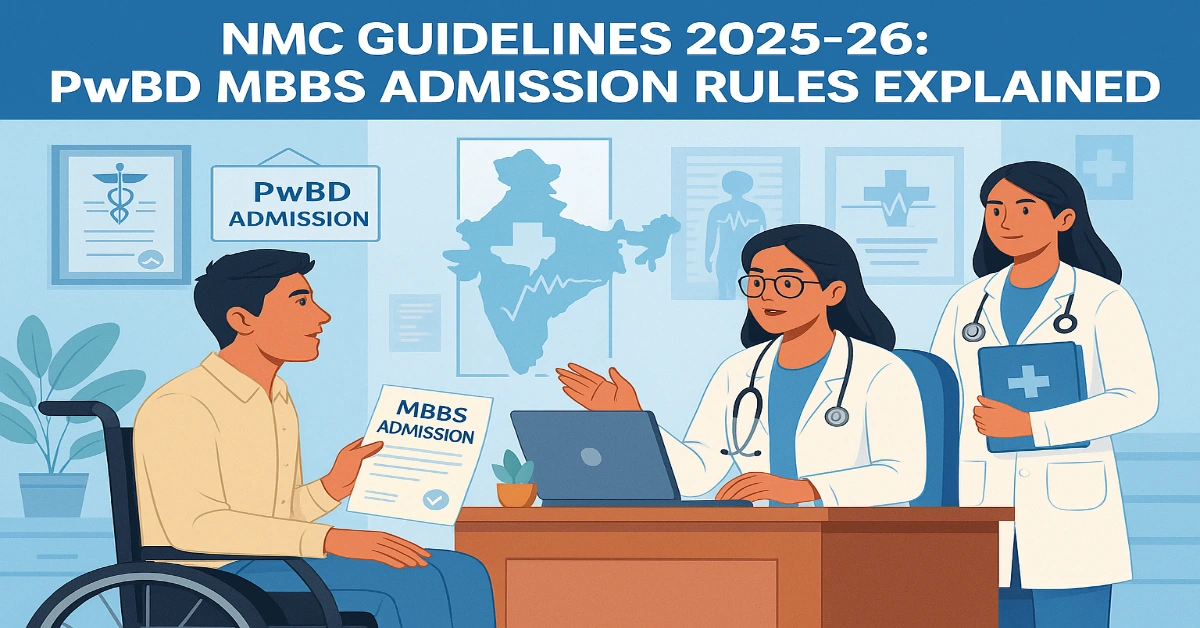NMC Guidelines 2025-26: The National Medical Commission (NMC) has issued interim NMC Guidelines 2025-26 for medical colleges. The guidelines aim to ensure the implementation of the RPwD Act, 2016, for PwBD MBBS admissions. The goal is to ensure equitable, non-discriminatory, and inclusive access to medical education while maintaining the clinical competence and safety standards required in medical practice.
These guidelines align with the Rights of Persons with Disabilities (RPwD) Act, 2016, and recent judicial and policy developments, including the Supreme Court judgment in Om Rathod vs. Union of India (October 25, 2024) and the MoSJE notification dated March 12, 2024.
| The Rights of Persons with Disabilities (RPwD) Act, 2016, mandates that institutions provide inclusive education for persons with disabilities, including non-discrimination, accessibility of facilities, provision of reasonable accommodations, and ensuring effective communication in admissions and education. |
NMC Guidelines 2025-26 for PwBD MBBS Admission: Legal and Policy Framework
The interim guidelines are issued in response to:
- Supreme Court Judgment: Om Rathod & Others vs Union of India & Others, highlighting disability inclusion.
- Pending Complaints: Filed with the Chief Commissioner for Persons with Disabilities.
- Representations from Candidates: Seeking clarity on PwBD admissions.
Om Rathod & Others vs Union of India & Others
| Point | Details |
|---|---|
| Case | Om Rathod vs DGHS & Ors (Supreme Court of India) |
| Petitioner | Om Rathod – medical aspirant, >80% disability (muscular dystrophy) |
| Issue | Denied MBBS admission under NMC’s “both hands intact” rule |
| Ruling | Supreme Court struck down the rule as arbitrary & discriminatory, violating RPwD Act, 2016 |
| Key Direction | Functional ability & reasonable accommodation must be assessed; disability boards to include experts |
| Significance | Set precedent for inclusive medical admissions; forced NMC to revise rules; empowered PwBD candidates |
The Expert Committee constituted by NMC reviewed Appendix H-1 of the Disability Guidelines, 2019 (earlier issued by MCI), to align it with:
- Rights of Persons with Disabilities (RPwD) Act, 2016.
- MoSJE Notification dated 12.03.2024 on inclusive education and reasonable accommodation.
Functional Competency-Based Approach
NMC has shifted from fixed disability percentage thresholds to a functional competency assessment. This ensures:
- Evaluation of what candidates can do, rather than focusing solely on limitations.
- Provision of reasonable accommodations for academic and clinical tasks.
- Balancing inclusion with patient safety and rigorous medical education standards.
This approach leverages assistive devices, evolving medical technologies, and modern learning methods to enable PwBD candidates to succeed in MBBS programs.
Key Highlights: Interim Guidelines for PwBD MBBS Admission 2025-26
Mandatory Documents for PwBD Candidates
All applicants under the PwBD category must submit:
- UDID Card: Issued by a Designated Medical Authority under the Ministry of Social Justice and Empowerment (MoSJE).
- Self-Certified Affidavit: In the format provided under Schedule I.
These documents will be verified by the Designated Medical Boards to ensure eligibility.
Unique Disability ID (UDID) Card
| Aspect | Details |
|---|---|
| Who Needs It | All Persons with Benchmark Disabilities (PwBD) appearing for NEET UG 2025 |
| Purpose | Official proof of disability to avail 5% PwBD reservation in MBBS/BDS admissions |
| Requirement During Counselling | Must be carried at the time of counselling; without it candidates risk disqualification or loss of reserved seats |
| Issuing Authority / Platform | Issued via the Swavlamban Portal (Government of India) |
| Details Mentioned on Card | Type and percentage of disability as per NEET eligibility norms |
| Importance | Mandatory for eligibility verification and seat allocation under PwBD quota |
Read Also: MCC Adds New Disability Centres for PwBD
Role of Designated Medical Boards
The Designated Medical Boards are responsible for:
- Verifying the self-declared competencies of candidates.
- Issuing reasoned, documented decisions if candidates cannot demonstrate essential competencies.
- Considering alternative functional abilities for candidates with partial limitations.
- Conducting a holistic assessment focused on abilities rather than disability percentages.
Institutional Responsibilities
Medical colleges must implement the guidelines in letter and spirit:
- Non-Discrimination (Section 16, RPwD Act, 2016): No student shall be denied admission due to disability.
- Barrier-Free Infrastructure (Section 45): Accessible classrooms, labs, libraries, hostels, and other facilities.
- Sensitisation Programs: Faculty and staff must receive training to support an inclusive learning environment.
- Dedicated Nodal Officer/Disability Cell: To address grievances and guide PwBD students.
Counselling and Admission Process
- Admissions will be processed based on NEET 2025 scores and college preferences.
- Medical colleges must provide reasonable accommodations for admitted PwBD students.
- All decisions from Designated Medical Boards are documented as speaking orders.
Also Read: MCC Issues New Guidelines for PwBD Candidates in NEET UG 2025 Admissions
Significance of the Interim Guidelines
The NMC’s interim guidelines reflect a progressive approach towards inclusive medical education:
- Functional Competency Focus: Evaluates what candidates can do rather than their disability percentage.
- Equity in Access: Ensures that PwBD candidates receive fair admission opportunities.
- Compliance with National Laws: Aligns with the RPwD Act, 2016 and MoSJE directives.
- Transparent Assessment: Standardised verification by Designated Medical Boards ensures fairness and consistency.
These measures are crucial to create an enabling environment where students with disabilities can pursue medical careers confidently while maintaining clinical competence and patient safety.
Advancing Inclusive Medical Education in India
The NMC Guidelines 2025-26 for PwBD MBBS Admission is a transformative milestone in Indian medical education:
- Moving from rigid disability thresholds to functional competency-based assessments.
- Promoting a diverse and inclusive medical workforce capable of serving society with competence and compassion.
- Ensuring that PwBD candidates have equitable opportunities, support, and accommodations throughout their medical education journey.
With these measures, PwBD MBBS candidates can confidently pursue MBBS in India, while institutions implement best practices for inclusive, accessible, and high-quality medical education.

